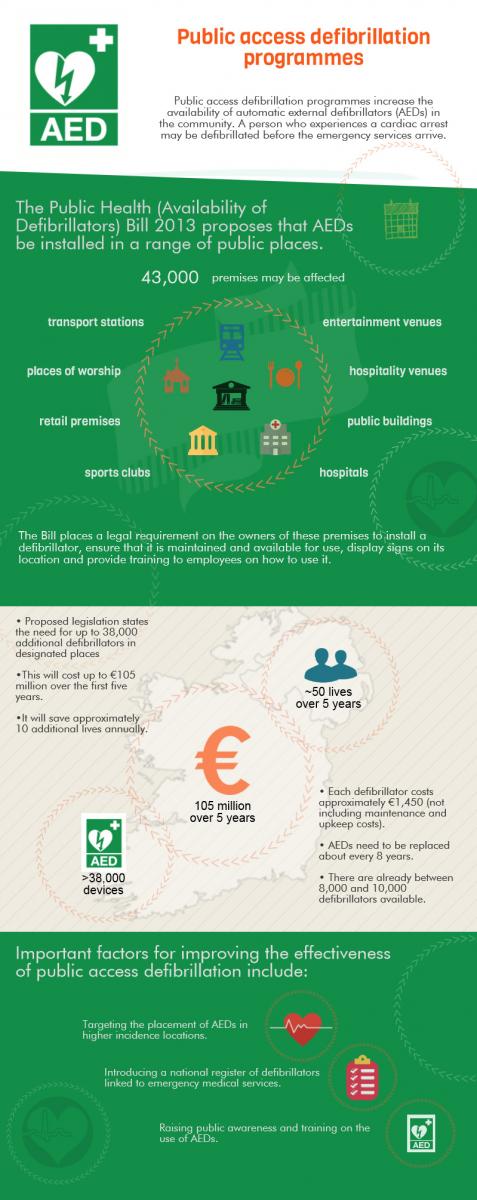HIQA publishes assessment of providing defibrillators in public places
The health technology assessment (HTA) of public access defibrillation, published by the Health Information and Quality Authority today, has advised the Minister for Health that if such a programme is introduced in Ireland, it should only be considered in conjunction with measures to increase the use of publicly-accessible defibrillators.
HIQA was asked by the previous Minister for Health to undertake this health technology assessment, to inform decision making on the Public Health (Availability of Defibrillators) Bill 2013. The Bill proposes the mandatory provision of static automated external defibrillators in a comprehensive list of designated places around the country.
HIQA’s Director of Health Technology Assessment Dr Máirín Ryan said: “The proposed legislation lists types of premises and venues that would be required to install and maintain a defibrillator as well as train staff in their use. HIQA’s analysis shows that, depending on the number of building types included, this type of programme would involve the provision of between 2,000 and 38,000 additional defibrillators and would save between two and 10 additional lives annually, at a total cost of between €5.3 million and €105 million over the first five years.
“Based on current data, none of the public access defibrillation programmes that we assessed would be considered cost-effective using conventional willingness to pay thresholds.
“As well as examining the programme outlined in the Bill, we also evaluated a number of scaled down programmes targeting only those building types with the highest incidence of cardiac arrest. Today in Ireland between 8,000 and 10,000 defibrillators are available, including at many of the high incidence locations where cardiac incidents are most likely to happen.”
“Targeted placing of defibrillators in higher incidence locations and a national defibrillator register linked to emergency medical services, together with significantly increased use of defibrillators via heightened public awareness, could render public access defibrillation programmes more cost-effective.
“Any prospective programme should start by targeting the mandatory deployment of defibrillators at locations with the highest incidence of out-of-hospital-cardiac-arrest.”
ENDs

Further Information:
Marty Whelan, Head of Communications and Stakeholder Engagement
mwhelan@hiqa.ie
Notes to the Editor:
- HIQA is the statutory organisation in Ireland with a responsibility to carry out national health technology assessments (HTAs) and to develop guidelines for the conduct of HTAs across our healthcare system.
- An automated external defibrillator (AED) is a small, portable device that analyses the heart rhythm of a person who has experienced cardiac arrest and delivers an electric shock through the chest wall. The electrical current momentarily stuns the heart, stopping the abnormal rhythm and helping the heart resume normal electrical activity.
- Public access defibrillation programmes are designed to improve survival from out-of-hospital cardiac arrest by reducing the time to defibrillation. They increase the availability of AEDs in the community so a person who experiences a cardiac arrest may be defibrillated by a member of the public before the emergency services arrive.
- The Public Health (Availability of Defibrillators) Bill 2013 identifies premises which will be required to install and maintain AEDs. These include hospitals, places of worship, hospitality and entertainment venues, sports clubs, transport stations, retail premises and public buildings. The Bill imposes an obligation on the owners of these premises to install a defibrillator, ensure that it is maintained and available for use, display signs on its location on how to use it, and provide training to employees. It has the capacity to affect 43,000 premises throughout Ireland.
- HIQA conducted a nationwide public consultation on a health technology assessment of public access defibrillation during 23 September – 17 October 2014. Following completion of the public consultation process the report was finalised and forms the basis of the advice from the Authority to the Minister for Health, to inform matters relating to the Bill.